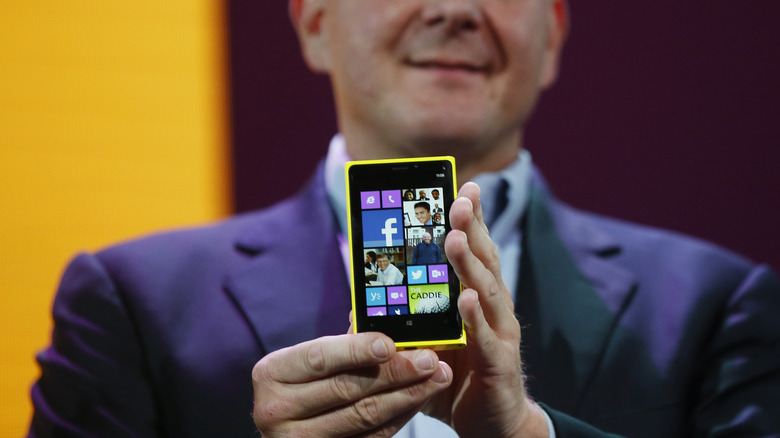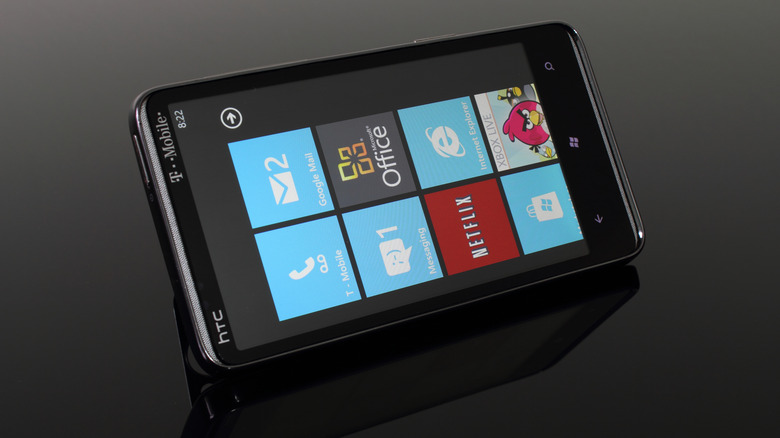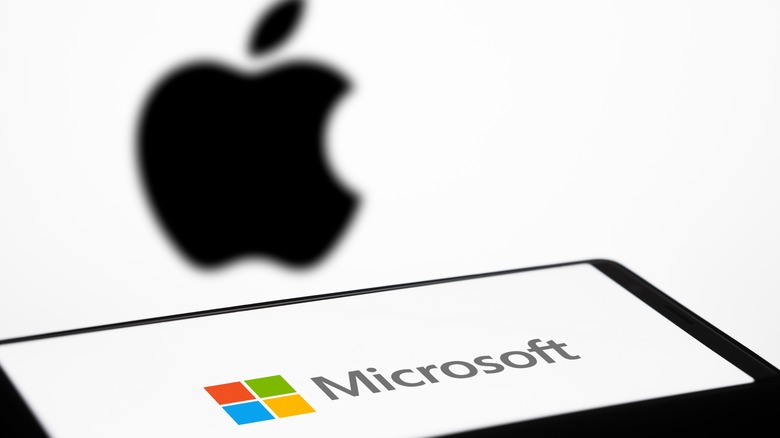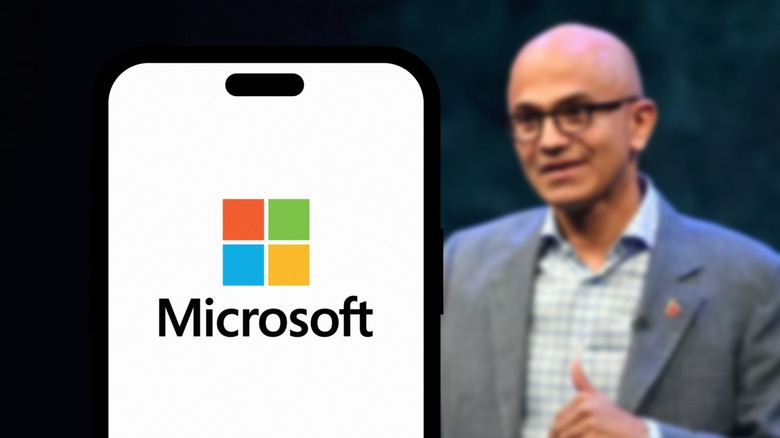Why Microsoft Made The 'Difficult Decision' To Discontinue Windows Phone
If you own a cell phone, chances are it's running iOS or Android. These two operating systems utterly dominate the market and are present on over 99% of phones currently in use worldwide. Beyond that, a handful of companies dominate the handset market in the United States with Apple and Samsung producing most of the devices, Motorola/Lenovo lagging behind the big two, and major companies like Google having to fight for the remaining scraps.
App support is one of the major factors that has put Apple and Google out in front. Both Apple's App Store and Google's Play Store have a wide array of apps available in them and deep support from the developers who create those apps. This never quite happened with Windows Phone for a number of reasons. Firstly, Windows Phone was a little late to the party, with iOS and Android already being well established when Microsoft's effort launched back in 2010. By the time Windows Phone arrived, iOS and Android already had well developed app stores and solid core customer bases. This likely limited Windows Phone's appeal quite drastically, and led to issues other OS developers both in and outside of the smartphone market still face to this day.
The situation was compounded by the fact that many developers are hesitant to use their limited resources to develop apps for a phone with a miniscule market share. This creates a kind of Catch 22 situation, one Microsoft certainly found itself in and that's one of the main reasons Windows Phone failed.
Phone users used to have more options
The cell phone market is essentially a choice between Windows and Android these days, but it wasn't always like this. There were other major players in the cell phone market not too long ago — with Microsoft being one of the bigger names around. Amazon also attempted to carve out a slice of the pie, and more minor companies than anyone can really name have also attempted to break into the market. All of them have failed.
It's easy to see why Microsoft decided to take a gamble on the Windows Phone. The tech company, which has dominated the PC operating sector for decades, decided to expand its ecosystem with a phone OS of its own. Big name manufacturers like Nokia got on board with it, and the whole project had the kind of backing that tech needs if it wants to carve out a share of a competitive and well established market.
Despite the fact smart phones hadn't really been around for that long when Windows Phone made its debut, the market was arguably set by the time Microsoft's product made its debut. Add in some questionable strategies, and it's all downhill from there.
Microsoft picked the wrong target
Apple and Microsoft have gone head to head for as long as both companies have existed. Microsoft won the battle for dominance in the PC market, commanding a 70-90% share of the pie in recent decades while the percentage of Mac users tends to hover around the mid-teens. So it's only natural that Microsoft sought to take on Apple in the smartphone market too.
The software giant acquired Nokia in an attempt to gain an edge on the hardware front. This in itself was not a bad decision, Google's successes following its collaboration with HTC show just how well this can work. However, Nokia's strengths didn't match well with Microsoft's ambitions. The long-standing phone manufacturer had an increasing amount of brand recognition in Asia, and a knack for producing power efficient, durable, and affordable devices. This meant they were in a good position to take on Android at the lower end of the market.
Microsoft wanted to take a shot at Apple, and the infighting that resulted between the Silicon Valley giant and Nokia is widely considered to be the final nail in the coffin for Windows Phone. A short time later, and with just a 2.5% share of the market, Microsoft finally pulled the plug on its foray into the smartphone world. For the time being, anyway.
Bill Gates takes some blame
When it comes to tech success stories, they don't get much bigger than Bill Gates. The Microsoft founder's impact in the tech world was enough to make him the world's richest man on a number of occasions, but he doesn't always get things right. While being interviewed at Village Global, the entrepreneur elaborated on just how big a failure Windows Phone was. Gates said:
"In the software world, particularly for platforms, these are winner-take-all markets. So the greatest mistake ever is whatever mismanagement I engaged in that caused Microsoft not to be what Android is. That is, Android is the standard non-Apple phone platform. That was a natural thing for Microsoft to win. It really is winner take all. If you're there with half as many apps or 90 percent as many apps, you're on your way to complete doom. There's room for exactly one non-Apple operating system and what's that worth? $400 billion that would be transferred from company G to company M."
In his answer, Gates accepts blame for the "mismanagement" of Windows Phone, but also highlights how the lack of apps hamstrung the project. Gates is also pessimistic about the amount of room in the market, claiming there's basically room for Apple and a competitor. That competitor could have been Microsoft, as it is in the home computing market, but Gates' company lost out to Google.
Ditching the Windows Phone is Microsoft's CEO's biggest regret
Unsurprisingly, the ultimate fate of the Windows Phone OS still causes some sleepless nights at Microsoft — particularly amongst the people at the top. The decision to discontinue the Windows Phone was one of the major decisions Satya Nadella made during his first years as CEO. It's also one he regrets, with the company leader telling Business Insider: "The decision I think a lot of people talk about – and one of the most difficult decisions I made when I became CEO — was our exit of what I'll call the mobile phone as defined then. In retrospect, I think there could have been ways we could have made it work by perhaps reinventing the category of computing between PCs, tablets, and phones."
Microsoft does still offer apps like Outlook for both iOS and Android. The ecosystem that was meant to form around the Windows Phone still exists to some degree too. Though it is mainly focused on increasing compatibility between Android phones and Windows PCs and technically competes with ecosystems companies like Google and Samsung are offering. Given the number of regrets at the upper echelons of Microsoft, and the kind of payoff that comes with seizing a large chunk of the lucrative smartphone market, we may not have seen the last of Windows Phone. Though, despite the resources Microsoft has at its disposal and the lessons learned from Windows Phone's first failure, making any successor a success will be far from easy.



